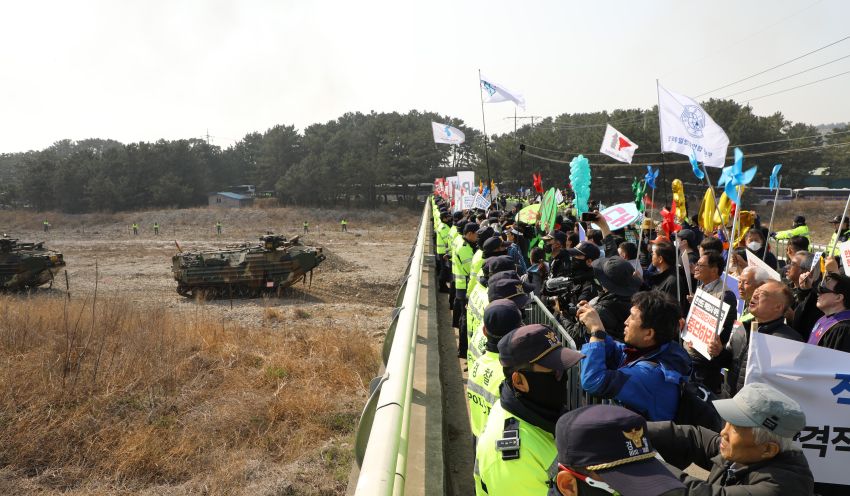
The largest United States overseas military base in the world is in Pyeongtaek, South Korea. Known to the US military as Camp Humphreys, it is located next to a city with a population of more than half a million. The base is the garrison for about 28,500 US troops and has a huge airfield and numerous other military facilities.
While US nuclear weapons have not been officially based in South Korea since 1991, the current conservative government of President Yoon Suk-yeol is pursuing “extended deterrence” measures that will include redeploying US strategic nuclear weapons to the Korean Peninsula.
The South Korean government has to pay more than US$1 billion dollars a year to the US for the privilege of hosting the base. Under the current “defense-sharing” agreement this amount will reach US$1.32 billion a year by 2025. The former Donald Trump administration demanded US$5 billion a year.
Thousands of peace activists will form a human chain around the base on July 27 — the 70th anniversary of the 1953 Korean War armistice/ceasefire — as part of a campaign for an official agreement to end the Korean War
In the war, the US and 15 allies, including Australia, fought against North Korea, which was later supported by Chinese troops. Nearly 4 million people — more than half of them Korean civilians — were killed.
Some 10 million people were separated from their families and displaced by the time the ceasefire was declared.
The US, which had air superiority right through the war, dropped 635,000 tons of bombs — significantly more than the 500,000 tons it dropped throughout the Pacific during World War II.
US air raids destroyed 40–90% of major cities and villages in North Korea. The war also destroyed more than 40% of what little manufacturing infrastructure South Korea had in 1949, and more than 60% of the same in the North, according to US historian Bruce Cumings’ book The Korean War: A History.
Simultaneous actions will take place around the world as part of the campaign; a mass demonstration is planned in the South Korean capital Seoul, on July 22; a peace symposium “From Armistice to Peace” on July 27; and an international petition (which can be signed here).
Hwang Sooyoung, from Korea Peace Appeal — one of the groups organising the campaign to end the Korean War — told Green Left: “Most people might be surprised to hear that the Korean War has not ended officially. This year it will be 70 years since the Korean War armistice and in the Korean Peninsula we live under a very unstable armistice and this year the danger of war is unprecedentedly high.
“The military arms race is very serious so we think ending the Korean War is a fundamental solution for peace. Seventy years is enough!”
The Korea Peace Appeal has four demands, Hwang explained:
- End the Korean War and establish a peace agreement
- Create a Korean Peninsula and a world free from nuclear weapons and nuclear threat
- Resolve the conflict with dialogue and cooperation instead of sanctions and pressure
- Break from the vicious cycle of the arms race and invest in human security and environmental sustainability
Korea Peace Appeal argues that because the war has not officially ended, a vicious cycle has been perpetuated in which trust easily turns into distrust leading to rising tensions.
After the Cold War ended, the Republic of Korea (ROK, South Korea) and the Democratic People’s Republic of Korea (DPRK, North Korea) agreed in 1991 on mutual respect and non-aggression.
The two Koreas held their first summit in 2000, which opened an era of comprehensive exchange and cooperation. The first-ever DPRK-US summit took place in 2018, along with three inter-Korean summits. But that positive dynamic has since been derailed.
According to the Korea Peace Appeal, while both sides have maintained the armistice, the Korean Peninsula has since become the central arena where the world's superpowers are vying for military hegemony.
It is also at the centre of a global arms race, including nuclear proliferation.
At its height, the US nuclear arsenal in South Korea comprised eight weapons systems consisting of 950 nuclear warheads, according to the Council of Foreign Relations, a powerful conservative US think tank. A right-wing campaign for South Korea to acquire its own nuclear weapons has been on the rise.
The threats from each side are also used as excuses to “limit individual rights in the name of national security in both Koreas”, says the Korean Peace Appeal.
Both governments dedicate significant portions of their limited budgets to military expenditure.
According to the Stockholm International Peace Research Institute (SIPRI), South Korea was ranked 10th in the world in terms of military spending, maintaining the same place for nine years in a row since 2013.
SIPRI estimated that South Korea's military spending in 2018 was about 27 times that of North Korea.
Global Fire Power, a private research institute based in the US, estimated that South Korea's military spending as at 2022 was about 10 times that of North Korea.
“The present South Korean government is focussed on reinforcing the US-ROK military alliance and is very hostile to the DPRK,” said Hwang.
“Right now, the South Korean government does not have much interest in cooperation and dialogue with North Korea. This is a very sad situation for the Korean people.
“Nowadays there are so many huge and aggressive military exercises in South Korea and US military strategic assets often come to South Korea,” she added.
“This is not a very hopeful situation but is another reason why we must push for peace and an end to the Korean War.”
Video: 70 years after armistice: It's time to end the Korean War!. Green Left.